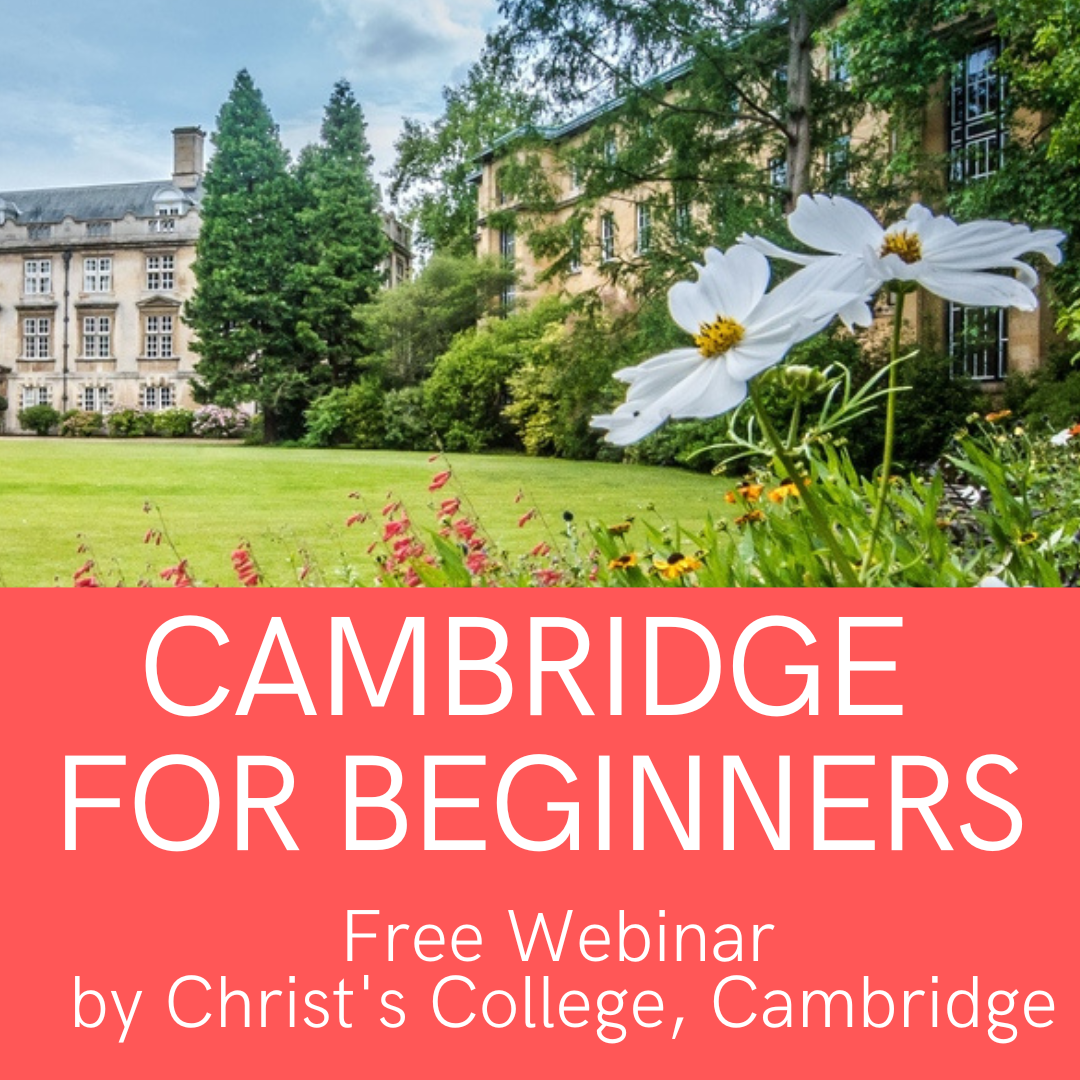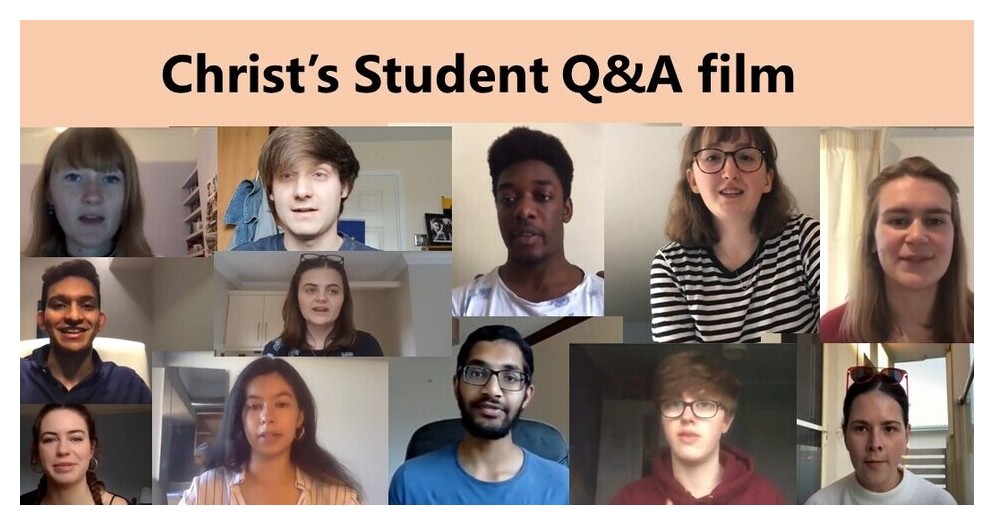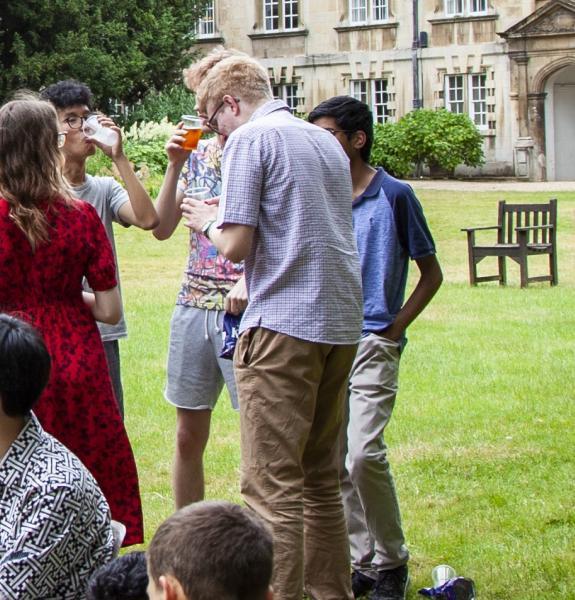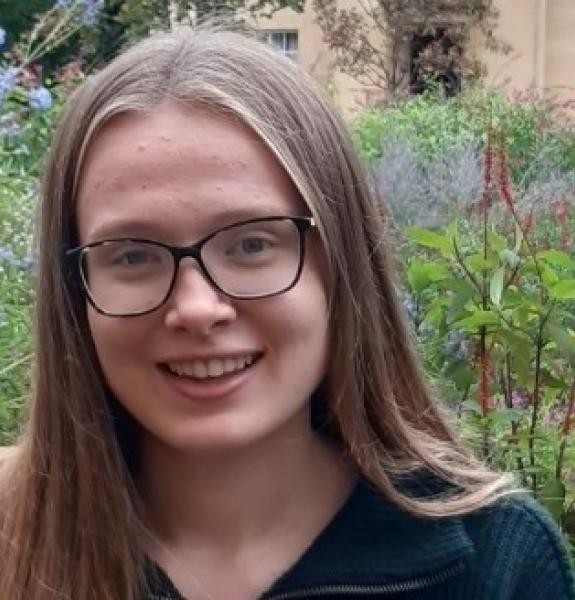
- Why study Natural Sciences at Christ's?
- Course content and structure
- Teaching
- What do our students think?
- What are we looking for?
- How to apply
- Helpful resources
- Open Days and Online Events
- Need more information?
| Booking is open for our Natural Sciences subject meeting on Wednesday 28 May |
Why study Natural Sciences at Christ's?
Christ's College has an illustrious history in Natural Sciences. Many top scientists have studied and worked here, including the legendary Charles Darwin, three Nobel Prize winners and many of today's most influential researchers. Enter Christ’s today and you join a vibrant science community of undergraduates, graduate students and Fellows.
The Darwin Society, our undergraduate science society, arranges a lively social calendar which includes an annual dinner and a garden party. On the scientific side, the society holds days to help local sixth-formers understand evolution and arranges interesting talks in College. It also created the fascinating Charles Darwin and Evolution website. You’ll also find plenty of Christ's students at university-wide clubs such as the CU Biological Society.
Course content and structure
Natural Sciences at Cambridge lets you study a wide range of subjects before you go on to specialise in a single topic in the later years. This means you get to explore a broad spectrum of interests as well as develop expertise in one aspect of science, which can be a real advantage for your future career.
The Natural Sciences course (or ‘tripos’) is a three or four-year degree. Please visit the University website for full details of the Natural Sciences course content and structure and then look at Natural Sciences course website. For detailed paper information you may find the individual subject information pages particularly helpful. If you have further questions about the course content please contact natsci@admin.cam.ac.uk.
Teaching
Christ’s central location is very handy for Natural Scientists, as most of your lectures take place a short walk or bike ride away. As well as lectures, practical classes and field trips organised by the University, you have weekly ‘supervisions’ here at College. These small-group tutorial sessions give you the advantage of personally-tailored tuition from active scientists researching a diverse range of subjects.
You have the chance to work in a real research laboratory and pursue exciting discoveries of your own. And if your work is very high quality, your name might end up listed on a published paper.
Directors of Studies
- Prof Tom Monie Director of Studies for Biological Natural Sciences
- Dr Mike Housden Director of Studies for Chemical Sciences
- Prof Gareth Rees Director of Studies for Physical Natural Sciences
Christ's fellows in Natural Sciences
|
|
What do our students think?

Read about the experiences of students who are studying Natural Sciences here at Christ’s - there's a lot of info in these student pages:
- Natural Sciences (Biological): Rachel, Sudina, James, Charlotte, Arqum, Adam, Imogen, Ryan, Xin-Yi and Hannah.
- Natural Sciences (Physical): Emily, Lucy, Elisavet, Eddie, Shadab, Ellie and Stratis.
If you’d like to hear from other Christ's students, please watch the Christ's student Q&A film, and visit our Student Profiles page.
What are we looking for?
We are looking for enthusiastic, motivated, gifted science students from all backgrounds. The admissions process is designed to provide all applicants with a level playing field. While we do expect you to have a good understanding of the syllabus you are studying, we are more interested in your enthusiasm and your ability to reason and think for yourselves.
How to Apply
Visit How to Apply for full details and a timeline of the application process. We welcome applicants from all backgrounds and school types, all over the world. If you’re applying from outside the UK, please read our international students section.
| News |
|---|
|
Biological or Physical Sciences?
You should select Natural Sciences on your UCAS form (code BCF0). You’ll then be asked in the My Cambridge Application form which option you wish to study:
- Biological Natural Sciences
- Physical Natural Sciences
Read more about these choices at Undergraduate Natural Sciences admission information.
Please note that both Biological and Physical Sciences students can choose from the full range of first year options. If you intend to specialise in Chemistry, you can follow either the Biological or Physical Sciences pathway as long as you meet the subject requirements below.
Subjects: What do you need?
If you are applying for Biological Natural Sciences at Christ's, you must be taking the following subjects at A level, IB Higher, Scottish Advanced Higher or equivalent.
Note that A-level Biology is not a pre-requisite for the study of Biological Natural Sciences, and that students intending to specialise in Chemistry can apply for either Natural Sciences (Biological) or Natural Sciences (Physical) as long as you meet the subject requirements. |
If you are applying for Physical Natural Sciences at Christ's, you must be taking the following subjects at A level, IB Higher, Scottish Advanced Higher or equivalent.
We would expect you to achieve an A* in A level Mathematics, or for IB students a Grade 7 in Higher Level Mathematics (Analysis and Approaches). Whilst we do not require any formal qualification in Further Mathematics, A level applicants who have undertaken either AS-level Further Mathematics or some equivalent study of Mathematics beyond the A-level Mathematics curriculum are likely to be more competitive than those who have not. Note that students with A-level Chemistry will have a broader choice of options during the first year of the degree programme than those offering Physics as their only experimental science. |
For both Biological and Physical sciences, we require students taking science A-levels to complete and pass the practical assessment.
If you are taking Scottish Advanced Highers please see the Natural Sciences page in our Scotland section, and we also welcome applicants with a range of other qualifications - see our international entrance requirements page and do not hesitate to contact the Admissions Office for advice on the subject combinations to take.
ESAT (Registration required)
All applicants for Natural Sciences at Cambridge must sit a computer-based assessment called the ESAT (Engineering and Science Admissions Test) as part of the application process. This is the same at all Cambridge Colleges.
| ESAT 2025 Registration deadline: To be confirmed (deadline expected to be available by early May) ESAT 2025 Test dates: Thursday 9 and Friday 10 October 2025 (as confirmed on the UAT UK website) |
You must register for and take the ESAT in the correct sitting. For students applying to Cambridge in September 2025 (for Oct 26 or deferred Oct 27 entry), please check the dates and details on the ESAT website from May 2025. You can normally create an account, pay the registration fee and register from early August, the registration deadline is normally mid-September (date to be confirmed), and you take the ESAT in person at a Pearson Vue Test Centre in mid-October. You must use the October sitting in the year you apply - tests sat on other dates are not accepted. There are test centres in countries all over the world. You will receive your results via Pearson Vue approx six weeks after you sit the test (results are automatically shared with us as well - you do not need to send them to us).
Please read the ESAT summary and then look at the ESAT-TMUA website for full details, including preparation information, how to register and book your test, and details for UK applicants in financial need and students who have access requirements for a disability.
There is no set score that we are looking for and we don't expect you to get every question right. The ESAT forms part of our holistic admissions process, which means that we will look at your scores in the context of your whole application.
Interviews
In late November you will receive an email letting you know whether or not you have been selected for interview. Interviews take place online in early December. The selected students are normally interviewed for 35-50 minutes in total. At Christ’s, we usually split the time into two interviews with subject-relevant academics, and you can choose to have your interviews at home (most applicants do this) or at school if easier.
The aim of the interviews is to determine applicants' potential to benefit from the Natural Sciences course. This is not the same as factual knowledge, or even necessarily past scholastic achievement: interviewers are more concerned to identify motivation and intellectual potential.
Natural Sciences interviews have no fixed format but might include, for example, discussion of aspects of school coursework, or being presented with a science question in an unfamiliar guise and being encouraged to think it through. Further, more general information about interviews (including two useful films) is available in the Cambridge interviews section, and it's worth also having a look at supervisions (short film here), as interviews are similar to what you do every week as a Cambridge student.
Offers
Christ's College does not have fixed quotas of places for different subjects and the exact numbers admitted in any one year will depend upon the strengths of the fields of applicants in various subjects. However, Christ's aim is to admit around 24 to 30 students each year in Natural Sciences.
We define the terms of each offer individually and you will need to be academically ambitious: conditional offers are likely to be minimum A*A*A at A-level, and for IB candidates 42 points overall, with 7,7,6 in relevant Higher Level subjects, but the majority of Christ’s students arrive with higher grades. Please note that we require A-level students to complete and pass the practical assessment in science subjects.
If you are applying for Natural Sciences (Physical), we would normally ask you to achieve an A* in A-level Mathematics, or a Grade 7 in Higher Level Mathematics (Analysis and Approaches) if you are doing the IB. Almost all successful NSP applicants who take A level Further Mathematics also achieve an A* in this subject.
You can look up other qualifications in the offer levels for other exam systems and international entry requirements, and if you are applying from outside the UK please read the Christ's international students section for further information and check the country pages.
If you will have finished school when you apply, please also read about post-qualification applications, taking a gap year, and, if relevant, applying from a university.
Helpful resources
| ESAT preparation materials | Including specification and sample tests with explained answers. There is also an archive of old NSAA papers that contain questions of the kind found in the ESAT. | ||
| Reading suggestions | Book / resource suggestions for all areas of the Natural Sciences course. Some of the student profiles also recommend books or say what they read. See for example Stratis, Charlotte, Arqum | ||
| Yourgenome | Website about DNA, genes and genomes by the Wellcome Genome Campus: | ||
| Big Picture Biology collection | Wellcome Trust Biology resources | ||
| IntoBiology website | Science news, careers guidance, and study skills support. | ||
| iBiology | US website featuring Biology talks | ||
| Biology podcasts | Teach Me Biology (revision podcast), The Infinite Monkey Cage, Genetics unzipped; Big Biology, The Natural Selection; Bio eats World | ||
| Covid-19 reading suggestions | COVID-19 vaccines: where we stand and challenges ahead SARS-CoV-2 evolution and vaccines: cause for concern? | ||
| Cambridge Chemistry Race | Chemistry Competition for teams of Sixth Form students | ||
| Periodic table resources | Royal Society of Chemistry materials including interactive table, app, articles, teacher view. | ||
| A future in Chemistry | Royal Society of Chemistry careers website | ||
| Isaac Physics | Website to help you develop problem-solving skills in Physics from GCSE to A-level through to the transition to university. See A-level resources and student support. There is also a mentoring scheme, events and opportunity to earn a summer school place. | ||
| Isaac Physics video lesson archive | These lessons cover the core syllabus for A level Physics. | ||
| Physics.org | Science news website | ||
| NASA STEM Engagement website | Enrichment resources from NASA | ||
| CERN Resources | Photos, films, reports etc. | ||
| Advanced Mathematics Support Programme | Advanced Mathematics Support Programme See in particular A level Mathematics resources and A level Further Mathematics resources. If you are studying independently, Integral offers an online Further Mathematics course. See studying an Advanced Maths option independently, and there are also free Further Maths videos. | ||
| Imperial College London A level Further Maths skills course | This is to support students taking Further Maths A level (so you can use the free version) - it does not replace the A level Further Maths qualification. | ||
| NRICH Mathematics | Free online resources to help you to develop the advanced applied mathematical skills needed to make the most of the study of sciences at university. See in particular BioNRICH, ChemNRICH, PhysNRICH, Advanced Scientific Mathematics and prepare for university, and live problems | ||
| HE+ Mathematics | Resources for students who would like to explore Maths beyond the school curriculum. | ||
| Earth Sciences introduction | Earth Sciences is one of the new sciences that you can study in first year - worth a look! | ||
| History and Philosophy of Science introduction | Another of the course options - you can take this from second year if you want to (see routes). | ||
| Zoology | Collections in the Cambridge Museum of Zoology and highlights from the collections Zoology podcasts (ZSL Wild Science) | ||
| Watch Cambridge Festival recordings | You can see a selection on Youtube from the 2021 festival including ones on organoids, developing Medicines in the pandemic, what we've learned about science communication in the pandemic and Marine Biology. There are also podcasts available from previous festivals | ||
| Gresham College Science lectures | Free lectures online including individual lectures such as Covid-19 and series such as Cosmic Concepts; The Unexpected Universe, The Nature of Reality, or Cancer: A fight we are steadily winning. You can search by topics e.g. Biology, Genetics, Immunology, Astronomy or Physics. | ||
| Oxford Physics public lectures | Looking at topics as diverse as the creation of the universe to the science of climate change. | ||
| Competitions | Quantum on the clock; Big Bang Competition; Schools' Analyst Competition; Newnham College Biological Sciences prize | ||
| Crest (Gold) Awards | Complete a project that makes an original contribution to a STEM field of study and submit your findings. | ||
| BBC | Inside Science Horizon Leading Edge | In their element The letters of Dorothy Hodgkin How to vaccinate the world | The science of temperature Putting science to work |
| HE+ Biology, HE+ Chemistry, HE+ Physics | Webpages for secondary school students who would like to explore science. | ||
| Finding out about research after the undergraduate degree. Hear from students from different departments. | Zoology - ZooCasts series 1 & ZooCasts series 2; Life Sciences - a day in our lives PhD students & a young person's guide to life sciences (aimed at younger children, but worth a watch by all!) | ||
| Darwin resources |
| ||
| USA Advanced Placement resources | Khan Academy resources: High School Biology; AP Biology; High School Chemistry; AP Chemistry; High School Physics; AP Physics 1; AP Physics II; AP Calculus BC | ||
| CamGuides | Introducing the academic and information skills that you will need during your studies, as well as how and where you would be working | ||
Come to an Open Day or Online Event
Online events: Our open days and events page advertises regular online opportunities as well as events you can attend in Cambridge. If you can, sign up for a College Open Day (these have online and optional in-person elements and include a subject meeting) and if you are from a state school and interested in Natural Sciences (Biological), apply for our Biological Sciences Taster Series to find out more about the College and the Natural Sciences course in person.
Further subject-specific opportunities you might wish to consider include Subject Masterclasses organised by Cambridge Admissions Office, Cambridge Physics Lectures and Natural Sciences-specific talks in the July Cambridge Open Days. Do also look out for the Cambridge Festival in March, as although it's not specifically for prospective students, there are a lot of science events. If you are a UK student from a background where there is little tradition of entry to Higher Education, you can apply to attend a Sutton Trust Summer School in Natural Sciences or to shadow a current Natural Sciences undergraduate via the Cambridge SU Shadowing

near New Court, Christ's
Scheme (do be aware that there's a high proportion of applicants to places for both of these last two opportunities so please don't be discouraged if you don't get a place).
Need more information?
For more detail of what the course involves, read Undergraduate Natural Sciences admissions on the University website, and look at the Natural Sciences Tripos website and overview booklet for prospective students too.
If you have any other queries, please send them to admissions@christs.cam.ac.uk and we’ll help however we can.
Back to the subject list / How to apply / Why choose Christ's?



